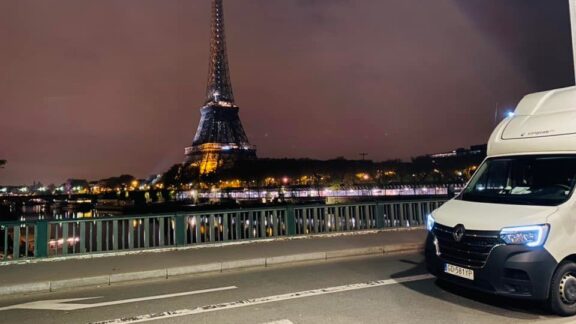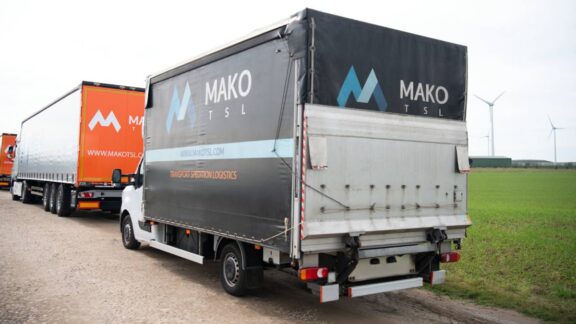Sports fans are being spoiled this summer – on one hand, we cheer for footballers in the EURO 2024 Championships, and on the other, the Olympics will kick off in Paris at the end of July. The Olympics will have a significant impact not only on the daily lives of residents but also on the economy, including freight transport. Problems related to road transportation can greatly affect delivery efficiency, operational costs, and product availability. Let’s explore the challenges facing transport companies during the Olympics and how to overcome them.
Traffic Disruptions
One of the main issues facing road freight transport in Paris is the traffic disruptions caused by increased activity related to the Olympics. The higher number of vehicles associated with the organization of the games and the influx of tourists are causing significant road congestion.
Road closures and restrictions on key routes and areas around sports venues can lead to delivery delays. Not only in these areas, but Paris authorities are also considering imposing a speed limit of just 50km/h on the city’s ring road during the Olympics.
Transport companies must tackle challenges related to planning alternative routes, which involves longer delivery times and higher operational costs. To do this effectively, every freight forwarder should be well-versed in the traffic regulations in Paris during the Olympics.
Time and Zone Restrictions for Road Transport in Paris
Paris authorities will implement a series of time and zone restrictions on road traffic to minimize the impact of the games on the city. This is especially true for central districts and areas around sports facilities.
Four special traffic zones are planned, marked with appropriate colors. The Black Zone, which will be completely closed off except for emergency services (police, Olympics organizers). The Gray Zone, a special area for the Olympics opening event, will be operational from July 18-26. Entry will only be possible with a special Pass Jeux permit issued by Paris authorities. After July 26, this zone will be entirely closed. The Red Zone, directly involved in the Olympics, will require a Pass Jeux permit throughout the Olympics. The final zone is the Blue Zone, which does not require a permit but will require various documents at the entry, such as written justification for entry in French (for example, a transport order).
The different zones in the city are not the only problem. It will be crucial to check the zones for specific days and times, as areas involved in the Olympics will change, and a street open in the morning might become completely impassable by noon. An interactive map highlighting these zones is available for this event to assist in planning deliveries in this critical area.
The mentioned Pass Jeux is free but issued based on a form by Paris authorities. It is personal, and during inspections, additional documents (ID, employment proof on the appropriate form, justification for entry, vehicle registration, driver’s photo) will be required. The Pass Jeux can be displayed on a special mobile app or printed, but processing the form takes time, so it is advisable to do this in advance.
Transport companies will have to adapt to these restrictions, which may mean delivering goods outside peak hours or at night. Such changes can impact operational efficiency and increase costs associated with working at unusual hours.
It may also turn out that areas previously accessible to 13.6-meter trucks will require transport with smaller vehicles, such as trucks up to 3.5t GVW. In extreme cases, routes previously served may become completely inaccessible to fleets with only one type of vehicle. Transport companies must consider this when planning deliveries during the Olympics.
Full Warehouses and Queues at Unloading Points
The Olympics generate increased demand for goods, which can lead to storage and distribution issues. Companies must deliver larger quantities of products to retail points, hotels, and food establishments, which can overload existing supply chains.
Over 8 million pick-ups or deliveries per week are planned this summer. This is almost twice the normal flow of goods in the French capital. The need to quickly adapt to changing customer needs can lead to product availability issues and the need to increase warehouse stocks.
In such a situation, it is crucial for transport companies to have a flexible and large fleet that can quickly respond to extreme situations. An increase in express orders to Paris is expected.
Problems Related to the Olympics Will Lead to Increased Operational Costs
Traffic disruptions, route changes, and the need to adjust delivery schedules to new conditions can lead to higher operational costs for transport companies.
Extended delivery times, increased fuel consumption, and additional charges associated with working outside normal hours are just some of the factors that can affect costs. Additionally, the need to invest in logistics management technology and adapt vehicle fleets to increased demands can further strain company budgets.
What Transport and Forwarding Companies Can Do to Prepare for the Paris Olympics
To mitigate the negative effects associated with road freight transport, companies must take several preventive measures. This will be a “trial by fire” that will reveal the strengths and weaknesses of both carriers and forwarding companies. Key will be the IT systems for managing logistics processes, which many companies in the TSL industry have been heavily investing in for several years. They will enable quick route optimization, help monitor traffic, and respond to changes in real-time.
Technology is one aspect, but the team of experts working in transport and forwarding companies is another, if not the most important, success factor in such extreme conditions as a worldwide event taking place in one city. A well-trained team, specialists from various fields of the TSL industry, and the appropriate scale of operation guaranteeing stability and delivery flexibility will determine business success in the coming months.
The 2024 Paris Olympics is a challenge not only for organizers and participants but also for companies involved in road freight transport. Traffic disruptions, time and zone restrictions, increased operational costs, and infrastructure challenges can significantly impact the efficiency and costs of transport. With appropriate preventive measures, transport companies can, however, mitigate negative effects and ensure delivery continuity. The upcoming Olympics will show how true the high-flown slogans of TSL industry companies about digitization and modern transport management are, and how much they are just empty phrases aimed at attracting customers.



